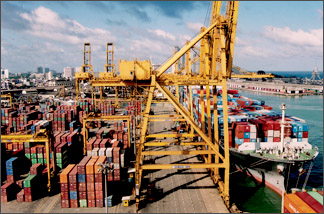Shippers' Council up in arms against arbitrary freight increases
The primary task of the Shippers' Council is to eliminate undue and
arbitrary increases in terminal handling charges (THC) and other charges
outside the freight rate which is a stumbling block to develop trade,
said the new Chairman of the Sri Lanka Shippers' Council Ananda
Wijesuriya.
 Wijesuriya who was appointed Chairman for 2007/2008 at the 37th AGM
of the Sri Lanka Shippers' Council on Wednesday said that he will seek
the support of the stakeholders of the industry to fight against this
monster created by some in the industry. Wijesuriya who was appointed Chairman for 2007/2008 at the 37th AGM
of the Sri Lanka Shippers' Council on Wednesday said that he will seek
the support of the stakeholders of the industry to fight against this
monster created by some in the industry.
"Freight rates are determined by market forces such as the supply and
demand and not by individuals who try to claim that they brought down
freight rates.
Arbitrary increases in freight rates without consultation has to be
condemned and action should to be taken against those who are acting
contrary to the interests of the industry," he said.
The shippers need to be more professional and focused in their task.
We could learn much from India which has developed its ports posing a
great challenge to Sri Lanka's hub status.
India maintains a 9.2 per cent GDP growth rate while China's economy
is expected to grow at a steady rate in the next few years.
Immediate past Chairman Sri Lanka Shippers' Council Jayanath Perera
said the failure to develop our infrastructure to keep pace with
developments in the region is due to the indifference of the
authorities.
The space crunch at the Colombo Port is aggravating and as a result
shipping lines are incurring a massive loss daily on account of the
space limitation and even if terminal operators work efficiently it is
of no avail, he said.
Perera said Sri Lanka's geographical strategic location is not good
enough to retain the hub status. India launched a rapid port development
program in the past six years.
Improvements in the rail-road system have helped develop trade. If
Lanka's infrastructure is not developed soon we will lose our hub status
and shipping lines will opt for other regional hubs for their import and
export consignments.
The Shippers' Council has a greater role to play in overcoming the
challenges the industry is now facing. A regional working arrangement
for freight charges and the use of Electronic Data Interchange (EDI)
should be looked into, he said.
He commended the Tea Board for introducing EDI for tea shippers to
eliminate unnecessary visits to the Department by export representatives
to obtain permits, he said.
LF
|
